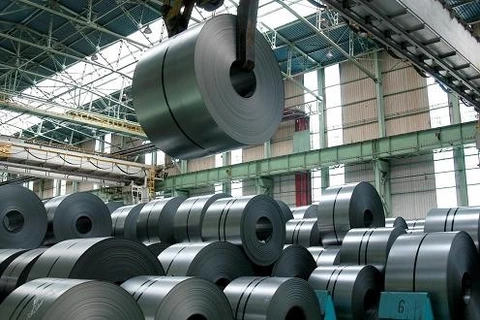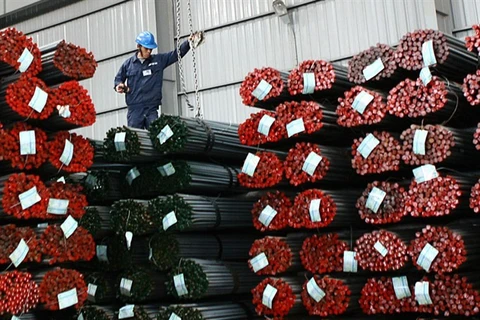Hanoi (VNA) – Steel prices will remain stable on the domestic market this month but are expected to increase slightly soon, according to the Ministry of Industry and Trade.
The ministry said in February that local steel prices, excluding value added tax (VAT), were similar to those of the previous month - 9.9-10.6 million VND (434-465 USD) per tonne of common steel bars in the north, and 10-10.7 million VND per tonne in the south. The price of rolled steel products stood at 10-10.6 million VND per tonne in the north and 10.2-10.9 million VND per tonne in the south.
Those prices will remain intact this month due to high supply and stable demand, as well as stability of the global steel prices.
However, those prices will likely increase 1-2 percent because the local construction market will experience strong growth in major cities this year due to high housing demand, the ministry said. Increasing demand for public investment will also push up prices.
The World Steel Association forecast that steel markets in Thailand, Malaysia, Vietnam, Indonesia and the Philippines would grow 6 percent due to demand for public investment and expansion of infrastructure, reported cafef.vn.
Meanwhile, according to the Government’s development plan for the steel industry by 2020, Vietnam will lack 15-20 percent of steel beams every year.
The ministry said that in the first two months of 2017, the steel industry produced 838,700 tonnes of drawn steel, a year-on-year increase of 21.4 percent; more than 1 million tonnes of rolled steel, a year-on-year surge of 35.4 percent; and 722,200 tonnes of flat and angle bar, up by 7.1 percent year-on-year.
The Ministry of Industry and Trade said domestic steel production was able to meet the entire demand for steel ingots, steel beams and cold rolled steel at 7-8 million tonnes per year.
But Vietnam could not produce domestically hot rolled steel that is essential input material for many industries, such as cold rolled steel, galvanised steel, steel pipe, shipbuilding and manufacturing, with a high demand on 10 million tonnes per year.
The nation still must import this product, resulting in a growing trade deficit and opening the door to cheap, low-grade imports to Vietnam.
The General Department of Customs reported that during the first two months of this year, the country imported 2.7 million tonnes of steel, spending 1.4 billion USD. The imports surged by 0.2 percent in volume and 49.3 percent in value.
Average import price in the first half of February reached 538.4 USD per tonne of steel, a year-on-year increase of 56 percent, and 378.7 USD per tonne of steel ingots, a year-on-year surge of 40 percent.
The Vietnam Steel Association said cheap price of steel imports has presented local steel producers with difficult competition. To protect local steel producers, the association has proposed that the Government impose defence measures for some imported steel products.-VNA
The ministry said in February that local steel prices, excluding value added tax (VAT), were similar to those of the previous month - 9.9-10.6 million VND (434-465 USD) per tonne of common steel bars in the north, and 10-10.7 million VND per tonne in the south. The price of rolled steel products stood at 10-10.6 million VND per tonne in the north and 10.2-10.9 million VND per tonne in the south.
Those prices will remain intact this month due to high supply and stable demand, as well as stability of the global steel prices.
However, those prices will likely increase 1-2 percent because the local construction market will experience strong growth in major cities this year due to high housing demand, the ministry said. Increasing demand for public investment will also push up prices.
The World Steel Association forecast that steel markets in Thailand, Malaysia, Vietnam, Indonesia and the Philippines would grow 6 percent due to demand for public investment and expansion of infrastructure, reported cafef.vn.
Meanwhile, according to the Government’s development plan for the steel industry by 2020, Vietnam will lack 15-20 percent of steel beams every year.
The ministry said that in the first two months of 2017, the steel industry produced 838,700 tonnes of drawn steel, a year-on-year increase of 21.4 percent; more than 1 million tonnes of rolled steel, a year-on-year surge of 35.4 percent; and 722,200 tonnes of flat and angle bar, up by 7.1 percent year-on-year.
The Ministry of Industry and Trade said domestic steel production was able to meet the entire demand for steel ingots, steel beams and cold rolled steel at 7-8 million tonnes per year.
But Vietnam could not produce domestically hot rolled steel that is essential input material for many industries, such as cold rolled steel, galvanised steel, steel pipe, shipbuilding and manufacturing, with a high demand on 10 million tonnes per year.
The nation still must import this product, resulting in a growing trade deficit and opening the door to cheap, low-grade imports to Vietnam.
The General Department of Customs reported that during the first two months of this year, the country imported 2.7 million tonnes of steel, spending 1.4 billion USD. The imports surged by 0.2 percent in volume and 49.3 percent in value.
Average import price in the first half of February reached 538.4 USD per tonne of steel, a year-on-year increase of 56 percent, and 378.7 USD per tonne of steel ingots, a year-on-year surge of 40 percent.
The Vietnam Steel Association said cheap price of steel imports has presented local steel producers with difficult competition. To protect local steel producers, the association has proposed that the Government impose defence measures for some imported steel products.-VNA
VNA
























